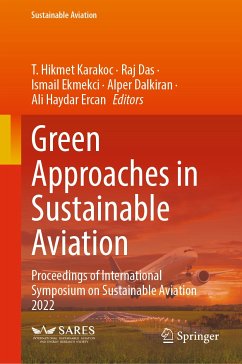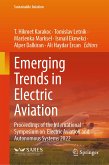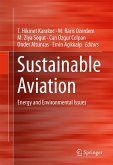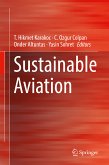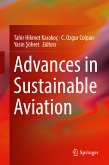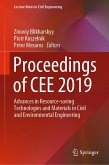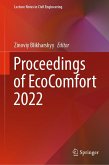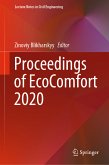Green Approaches in Sustainable Aviation (eBook, PDF)
Proceedings of International Symposium on Sustainable Aviation 2022
Gebundener Preis 213,99 €**
203,29 €**
**Bis zum 31.03.2025 gebundener Aktionspreis des Verlages
inkl. MwSt. und vom Verlag festgesetzt.

0 °P sammeln
Green Approaches in Sustainable Aviation (eBook, PDF)
Proceedings of International Symposium on Sustainable Aviation 2022
- Format: PDF
- Merkliste
- Auf die Merkliste
- Bewerten Bewerten
- Teilen
- Produkt teilen
- Produkterinnerung
- Produkterinnerung

Bitte loggen Sie sich zunächst in Ihr Kundenkonto ein oder registrieren Sie sich bei
bücher.de, um das eBook-Abo tolino select nutzen zu können.
Hier können Sie sich einloggen
Hier können Sie sich einloggen
Sie sind bereits eingeloggt. Klicken Sie auf 2. tolino select Abo, um fortzufahren.

Bitte loggen Sie sich zunächst in Ihr Kundenkonto ein oder registrieren Sie sich bei bücher.de, um das eBook-Abo tolino select nutzen zu können.
Sustainable aviation is a long-term strategy to provide innovative solutions to the industry’s environmental challenges. The International Symposium on Sustainable Aviation is a multi-disciplinary symposium that presents research on current sustainability-based issues and future trends in aviation from an economic, social, and environmental perspective. The conference provides a platform offering insights on a broad range of current issues in aviation, such as aviation and environment, commercial air transport, regulations and policy, sustainable aerospace vehicles and technologies, and…mehr
- Geräte: PC
- ohne Kopierschutz
- eBook Hilfe
- Größe: 8.27MB
- Upload möglich
Andere Kunden interessierten sich auch für
![Emerging Trends in Electric Aviation (eBook, PDF) Emerging Trends in Electric Aviation (eBook, PDF)]() Emerging Trends in Electric Aviation (eBook, PDF)203,29 €
Emerging Trends in Electric Aviation (eBook, PDF)203,29 €![Sustainable Aviation (eBook, PDF) Sustainable Aviation (eBook, PDF)]() Sustainable Aviation (eBook, PDF)73,95 €
Sustainable Aviation (eBook, PDF)73,95 €![Sustainable Aviation (eBook, PDF) Sustainable Aviation (eBook, PDF)]() Sustainable Aviation (eBook, PDF)53,95 €
Sustainable Aviation (eBook, PDF)53,95 €![Advances in Sustainable Aviation (eBook, PDF) Advances in Sustainable Aviation (eBook, PDF)]() Advances in Sustainable Aviation (eBook, PDF)97,95 €
Advances in Sustainable Aviation (eBook, PDF)97,95 €![Proceedings of CEE 2019 (eBook, PDF) Proceedings of CEE 2019 (eBook, PDF)]() Proceedings of CEE 2019 (eBook, PDF)113,95 €
Proceedings of CEE 2019 (eBook, PDF)113,95 €![Proceedings of EcoComfort 2022 (eBook, PDF) Proceedings of EcoComfort 2022 (eBook, PDF)]() Proceedings of EcoComfort 2022 (eBook, PDF)233,95 €
Proceedings of EcoComfort 2022 (eBook, PDF)233,95 €- -29%11
![Proceedings of EcoComfort 2020 (eBook, PDF) Proceedings of EcoComfort 2020 (eBook, PDF)]() Proceedings of EcoComfort 2020 (eBook, PDF)113,95 €
Proceedings of EcoComfort 2020 (eBook, PDF)113,95 € -
-
- -29%11
Sustainable aviation is a long-term strategy to provide innovative solutions to the industry’s environmental challenges. The International Symposium on Sustainable Aviation is a multi-disciplinary symposium that presents research on current sustainability-based issues and future trends in aviation from an economic, social, and environmental perspective. The conference provides a platform offering insights on a broad range of current issues in aviation, such as aviation and environment, commercial air transport, regulations and policy, sustainable aerospace vehicles and technologies, and environmental modeling and measurements. The ISSA symposium allows researchers, scientists, engineers, practitioners, policymakers, and students to exchange information, present new technologies and developments, and discuss future direction, strategies, and priorities in sustainable aviation topics.
Produktdetails
- Produktdetails
- Verlag: Springer Nature Switzerland
- Erscheinungstermin: 10. Oktober 2023
- Englisch
- ISBN-13: 9783031331183
- Artikelnr.: 69136493
- Verlag: Springer Nature Switzerland
- Erscheinungstermin: 10. Oktober 2023
- Englisch
- ISBN-13: 9783031331183
- Artikelnr.: 69136493
- Herstellerkennzeichnung Die Herstellerinformationen sind derzeit nicht verfügbar.
T. Hikmet Karakoc, Ph.D., graduated from Anadolu University, the Department of Mechanical Engineering. He received his M.Sc. degree in Mechanical Engineering from the Yildiz Technical University. He received his Ph.D. from Anadolu University, where he started his full-time teaching and received his Full Professorship. He is currently researching at the Eskisehir Technical University. He has a wide range of research interests, including Sustainable Aviation, Aircraft Propulsion Systems, Insulation, Heating, Ventilating, and Air Conditioning, Indoor Air Quality, Gas Turbines, Cogeneration Systems, Renewable Energy, Energy Economics, Fuels, and Combustion. He has participated in numerous industrial projects on these topics as a researcher, consultant, and project manager for over 30 projects and corporations. He also started a contest on special insulation applications among university students. He served as an Editor-in-Chief, guest editor, and editorial board member for international scientific journals. He published national and international papers in over 300 journals and 40 books. Professor Karakoc actively follows membership positions for the Chamber of Mechanical Engineers and many sectorial associations, international scientific organizations, and societies. He is an active Board of Directors member of the International Association for Green Energy. He is currently holding the presidency of the SARES organization, which is actively supporting scientists and students in the area of Sustainable Aviation. He also organizes four symposiums on aviation subject areas as a Founding Chair.
Raj Das, Ph.D., is a Full Professor of Applied Mechanics and leads the Simulation of Advanced Materials and Structures (SAMS) research group at the Sir Lawrence Wackett Research Centre of RMIT University, Australia. He is the Program Director in the Aerospace Engineering and Aviation discipline of the School of Engineering. He is also an honorary academic at the University of Auckland, New Zealand, and the University of Quebec, Canada. Professor Das has nearly 20 years of experience designing, analyzing, and optimizing engineering materials and structures, focusing on computational mechanics, structural optimization, composite structures, failure analysis, and damage tolerance design. He has published more than 300 papers in international journals and conferences in collaboration with several universities, institutes, and industries. Professor Das has a Ph.D. in Applied Mechanics from Monash University, Australia, and previously worked at the University of Auckland, the Commonwealth Scientific and Industrial Research Organisation, and the University of Manchester. He is associated with various scientific and technical societies broadly related to theoretical and applied mechanics. He is the President of the International Congress on Mechanical Behaviour of Materials (ICM) and represents Australia as a Director on the Executive Committee of the International Congress on Fracture (ICF). Within Australia, Professor Das is Chair of the National Committee on Applied Mechanics of Engineers Australia. He has chaired/co-chaired several well-known conferences, including ICM-13, ACAM-8, ACCM-3, and ICCM-6.
İsmail Ekmeki, Ph.D., graduated from Yildiz Technical University Mechanical Engineering Department in 1980. He completed an MSc degree in the School of Science from Yildiz Technical University in 1982 in Mechanical Engineering and an MSc in Industrial Engineering from İstanbul Technical University in 1983. He received a Ph.D. from Yildiz Technical University in 1995 in Mechanical Engineering. He studied as an academic staff member at Yildız Technical University, Sakarya University, and Marmara University and continues his academic career at Istanbul Ticaret University. He has worked as a researcher, executive, and manager in academic positions with various industrial projects. His research interests cover energy, optimization, decision-making, safety, OHS, and HVAC-related topics.
Alper Dalkıran, Ph.D., received his bachelor’s degree Faculty of Aeronautics and Astronautics at Eskisehir Technical University (formerly known as Anadolu University) from the Avionics Department. He completed his MSc degree in the School of Science from Anadolu University in 2004 in Aviation Maintenance. He earned his Ph.D. degree in 2017 in Environmental Sustainability on Airports from the School of Science at Anadolu University by developing a model of energy-based calculations of an aerodrome. He has studied aircraft engines, sustainability, airports, and exergy. He has 17 years of professional experience in Airports in Information Technology, Automation, and Integration. He has managed teams on system design, projects, tests, commissioning, operational readiness, and operations. He has been working in the School of Aviation at Suleyman DemirelUniversity since 2019 and lecturing in Flight Theory, Airline Management, and Airport Design subjects.
Ali Haydar Ercan, Ph.D., is currently a Lecturer in the Electronics and Automation Department at Porsuk Porsuk Vocational School at Eskisehir Technical University. He received his bachelor’s degree in mechanical engineering from the Faculty of Engineering at the University of Cumhuriyet, Sivas, his MSc degree in mechanical engineering from the University of Gazi, Ankara, and his Ph.D. from the Department of Aerodynamics at the University of Liverpool, where he worked on boundary layer theory on flat plate surfaces and developed empiric formulas for transition development distance. He also earned a postgraduate degree in software technologies from the University of Liverpool. Dr. Ercan has a wide range of managerial experience with international commercial private companies.
Raj Das, Ph.D., is a Full Professor of Applied Mechanics and leads the Simulation of Advanced Materials and Structures (SAMS) research group at the Sir Lawrence Wackett Research Centre of RMIT University, Australia. He is the Program Director in the Aerospace Engineering and Aviation discipline of the School of Engineering. He is also an honorary academic at the University of Auckland, New Zealand, and the University of Quebec, Canada. Professor Das has nearly 20 years of experience designing, analyzing, and optimizing engineering materials and structures, focusing on computational mechanics, structural optimization, composite structures, failure analysis, and damage tolerance design. He has published more than 300 papers in international journals and conferences in collaboration with several universities, institutes, and industries. Professor Das has a Ph.D. in Applied Mechanics from Monash University, Australia, and previously worked at the University of Auckland, the Commonwealth Scientific and Industrial Research Organisation, and the University of Manchester. He is associated with various scientific and technical societies broadly related to theoretical and applied mechanics. He is the President of the International Congress on Mechanical Behaviour of Materials (ICM) and represents Australia as a Director on the Executive Committee of the International Congress on Fracture (ICF). Within Australia, Professor Das is Chair of the National Committee on Applied Mechanics of Engineers Australia. He has chaired/co-chaired several well-known conferences, including ICM-13, ACAM-8, ACCM-3, and ICCM-6.
İsmail Ekmeki, Ph.D., graduated from Yildiz Technical University Mechanical Engineering Department in 1980. He completed an MSc degree in the School of Science from Yildiz Technical University in 1982 in Mechanical Engineering and an MSc in Industrial Engineering from İstanbul Technical University in 1983. He received a Ph.D. from Yildiz Technical University in 1995 in Mechanical Engineering. He studied as an academic staff member at Yildız Technical University, Sakarya University, and Marmara University and continues his academic career at Istanbul Ticaret University. He has worked as a researcher, executive, and manager in academic positions with various industrial projects. His research interests cover energy, optimization, decision-making, safety, OHS, and HVAC-related topics.
Alper Dalkıran, Ph.D., received his bachelor’s degree Faculty of Aeronautics and Astronautics at Eskisehir Technical University (formerly known as Anadolu University) from the Avionics Department. He completed his MSc degree in the School of Science from Anadolu University in 2004 in Aviation Maintenance. He earned his Ph.D. degree in 2017 in Environmental Sustainability on Airports from the School of Science at Anadolu University by developing a model of energy-based calculations of an aerodrome. He has studied aircraft engines, sustainability, airports, and exergy. He has 17 years of professional experience in Airports in Information Technology, Automation, and Integration. He has managed teams on system design, projects, tests, commissioning, operational readiness, and operations. He has been working in the School of Aviation at Suleyman DemirelUniversity since 2019 and lecturing in Flight Theory, Airline Management, and Airport Design subjects.
Ali Haydar Ercan, Ph.D., is currently a Lecturer in the Electronics and Automation Department at Porsuk Porsuk Vocational School at Eskisehir Technical University. He received his bachelor’s degree in mechanical engineering from the Faculty of Engineering at the University of Cumhuriyet, Sivas, his MSc degree in mechanical engineering from the University of Gazi, Ankara, and his Ph.D. from the Department of Aerodynamics at the University of Liverpool, where he worked on boundary layer theory on flat plate surfaces and developed empiric formulas for transition development distance. He also earned a postgraduate degree in software technologies from the University of Liverpool. Dr. Ercan has a wide range of managerial experience with international commercial private companies.
Chapter 1. A Short Review on Taxation Action in the Sustainability of Green Airports.- Chapter 2. A Covariance Matching Based Adaptive EKF for Nanosatellite Attitude Estimation.- Chapter 3. Internal Heat Gain in Airport Buildings Via Occupants.- Chapter 4. Cold Flow Properties of Biojet Fuels in Aviation.- Chapter 5. Innovative Process for the Purification of Green Aviation Fuel Additive "Dimethoxymethane": Pervaporation.- Chapter 6. Deceleration Behavior of Super-Lightweight XPS Foams: Number of Layers Effect.- Chapter 7. Green Purchase Intention in the Air Travel Industry: Influence of Environmental Knowledge and Attitude.- Chapter 8. Evaluation of Air Transport Projects Development by (AHP).- Chapter 9. A Comparative Study of the Reporting Approach for Corporate Social and Environmental Responsibility between Iberia and Turkish Airlines.- Chapter 10. Fuel Efficient Flight Level Assignments Under Wind Uncertainties for the Conflict Resolution Problem at the En-Route Phase.- Chapter 11. MCDM Risk Assessment in Ground Operation.- Chapter 12. Optimization of Cutting Parameters in Face Milling of Waspaloy Superalloy.- Chapter 13. The Role of Additive Manufacturing towards Sustainable Aerospace Structures.- Chapter 14. Aerodynamic Performance Analysis of Penguin-Inspired Biomimetic Aircraft Wing.- Chapter 15. Leading and Trailing Edge Configuration for Distributed Electric Propulsion Systems.- Chapter 16. Cost and Weight Optimization of Recyclable Honeycomb Sandwich Panels.- Chapter 17. Negative Emission Technologies: Miraculous Solution or Aberrant Blindness?.- Chapter 18. Sustainable Operations for Airport Warehouse Cargo Management.- Chapter 19. Outlines of Sustainable Air Transportation in ICAO Annex Documents: Roots of Sustainability.- Chapter 20. World Air Transportation Recovery after COVID-19 Restricts.
Chapter 1. A Short Review on Taxation Action in the Sustainability of Green Airports.- Chapter 2. A Covariance Matching Based Adaptive EKF for Nanosatellite Attitude Estimation.- Chapter 3. Internal Heat Gain in Airport Buildings Via Occupants.- Chapter 4. Cold Flow Properties of Biojet Fuels in Aviation.- Chapter 5. Innovative Process for the Purification of Green Aviation Fuel Additive "Dimethoxymethane": Pervaporation.- Chapter 6. Deceleration Behavior of Super-Lightweight XPS Foams: Number of Layers Effect.- Chapter 7. Green Purchase Intention in the Air Travel Industry: Influence of Environmental Knowledge and Attitude.- Chapter 8. Evaluation of Air Transport Projects Development by (AHP).- Chapter 9. A Comparative Study of the Reporting Approach for Corporate Social and Environmental Responsibility between Iberia and Turkish Airlines.- Chapter 10. Fuel Efficient Flight Level Assignments Under Wind Uncertainties for the Conflict Resolution Problem at the En-Route Phase.- Chapter 11. MCDM Risk Assessment in Ground Operation.- Chapter 12. Optimization of Cutting Parameters in Face Milling of Waspaloy Superalloy.- Chapter 13. The Role of Additive Manufacturing towards Sustainable Aerospace Structures.- Chapter 14. Aerodynamic Performance Analysis of Penguin-Inspired Biomimetic Aircraft Wing.- Chapter 15. Leading and Trailing Edge Configuration for Distributed Electric Propulsion Systems.- Chapter 16. Cost and Weight Optimization of Recyclable Honeycomb Sandwich Panels.- Chapter 17. Negative Emission Technologies: Miraculous Solution or Aberrant Blindness?.- Chapter 18. Sustainable Operations for Airport Warehouse Cargo Management.- Chapter 19. Outlines of Sustainable Air Transportation in ICAO Annex Documents: Roots of Sustainability.- Chapter 20. World Air Transportation Recovery after COVID-19 Restricts.
Chapter 1. A Short Review on Taxation Action in the Sustainability of Green Airports.- Chapter 2. A Covariance Matching Based Adaptive EKF for Nanosatellite Attitude Estimation.- Chapter 3. Internal Heat Gain in Airport Buildings Via Occupants.- Chapter 4. Cold Flow Properties of Biojet Fuels in Aviation.- Chapter 5. Innovative Process for the Purification of Green Aviation Fuel Additive "Dimethoxymethane": Pervaporation.- Chapter 6. Deceleration Behavior of Super-Lightweight XPS Foams: Number of Layers Effect.- Chapter 7. Green Purchase Intention in the Air Travel Industry: Influence of Environmental Knowledge and Attitude.- Chapter 8. Evaluation of Air Transport Projects Development by (AHP).- Chapter 9. A Comparative Study of the Reporting Approach for Corporate Social and Environmental Responsibility between Iberia and Turkish Airlines.- Chapter 10. Fuel Efficient Flight Level Assignments Under Wind Uncertainties for the Conflict Resolution Problem at the En-Route Phase.- Chapter 11. MCDM Risk Assessment in Ground Operation.- Chapter 12. Optimization of Cutting Parameters in Face Milling of Waspaloy Superalloy.- Chapter 13. The Role of Additive Manufacturing towards Sustainable Aerospace Structures.- Chapter 14. Aerodynamic Performance Analysis of Penguin-Inspired Biomimetic Aircraft Wing.- Chapter 15. Leading and Trailing Edge Configuration for Distributed Electric Propulsion Systems.- Chapter 16. Cost and Weight Optimization of Recyclable Honeycomb Sandwich Panels.- Chapter 17. Negative Emission Technologies: Miraculous Solution or Aberrant Blindness?.- Chapter 18. Sustainable Operations for Airport Warehouse Cargo Management.- Chapter 19. Outlines of Sustainable Air Transportation in ICAO Annex Documents: Roots of Sustainability.- Chapter 20. World Air Transportation Recovery after COVID-19 Restricts.
Chapter 1. A Short Review on Taxation Action in the Sustainability of Green Airports.- Chapter 2. A Covariance Matching Based Adaptive EKF for Nanosatellite Attitude Estimation.- Chapter 3. Internal Heat Gain in Airport Buildings Via Occupants.- Chapter 4. Cold Flow Properties of Biojet Fuels in Aviation.- Chapter 5. Innovative Process for the Purification of Green Aviation Fuel Additive "Dimethoxymethane": Pervaporation.- Chapter 6. Deceleration Behavior of Super-Lightweight XPS Foams: Number of Layers Effect.- Chapter 7. Green Purchase Intention in the Air Travel Industry: Influence of Environmental Knowledge and Attitude.- Chapter 8. Evaluation of Air Transport Projects Development by (AHP).- Chapter 9. A Comparative Study of the Reporting Approach for Corporate Social and Environmental Responsibility between Iberia and Turkish Airlines.- Chapter 10. Fuel Efficient Flight Level Assignments Under Wind Uncertainties for the Conflict Resolution Problem at the En-Route Phase.- Chapter 11. MCDM Risk Assessment in Ground Operation.- Chapter 12. Optimization of Cutting Parameters in Face Milling of Waspaloy Superalloy.- Chapter 13. The Role of Additive Manufacturing towards Sustainable Aerospace Structures.- Chapter 14. Aerodynamic Performance Analysis of Penguin-Inspired Biomimetic Aircraft Wing.- Chapter 15. Leading and Trailing Edge Configuration for Distributed Electric Propulsion Systems.- Chapter 16. Cost and Weight Optimization of Recyclable Honeycomb Sandwich Panels.- Chapter 17. Negative Emission Technologies: Miraculous Solution or Aberrant Blindness?.- Chapter 18. Sustainable Operations for Airport Warehouse Cargo Management.- Chapter 19. Outlines of Sustainable Air Transportation in ICAO Annex Documents: Roots of Sustainability.- Chapter 20. World Air Transportation Recovery after COVID-19 Restricts.
